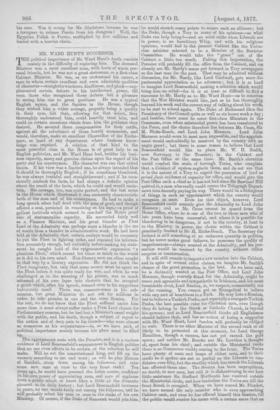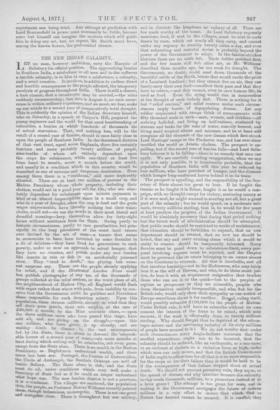MR. WARD HUNT'S SUCCESSOR. T HE political importance of Mr. Ward
Hunt's death consists mainly in the difficulty of replacing him. The deceased Minister was a most excellent man, with hosts of warm per- sonal friends, but he was not a great statesman or a first-class Cabinet Minister. He was, as we understand his career, a man in whom certain excellent and even admirable qualities of character—straightforwardness, kindliness, and pluck—sup- plemented certain defects in his intellectual power, till even those who recognised those defects felt a pleasure in seeing him rise to great positions. He was a typical English squire, and the Squires in the House, though they wished him a wider acreage, property being a quality in their eyes, felt that, allowing for that defect, they thoroughly understood him, could heartily trust him, and could on certain occasions obtain from him. the guidance they desired. He secured them compensation for their cattle, against all the reluctance of those horrid economists, and would, therefore, make an excellent Chancellor of the Exche- quer, or head of any department where business know- ledge was required. A relation of that kind to the most powerful class in the House is of great help to an English politician, and. Mr. Ward Hunt had, besides his busi- ness capacity, many and genuine claims upon the regard of his party and his countrymen. His character was one that suited theirs. If his view was a limited one, he always intended that it should be thoroughly English ; if he sometimes blundered, he was always truthful and straightforward ; and if he occa- sionally mistook the facts, he had always a definite opinion about the result of the facts, which he could and would main- tain. His courage, too, was quite perfect, and the last scene in the House which illustrated it was eminently characteristic both of the man and of his countrymen. He had to make a long speech when half dead with the pain of gout, and though offered a seat, persisted in remaining on his legs' —a proof of gallant fortitude which seemed to one-half the House proof also of statesmanlike capacity. He succeeded fairly well as a Finance Minister, and his great blunder as First Lord of the Admiralty was perhaps more a blunder in the use of words than a blunder in administrative work. He had been told at the Admiralty that certain outlays would be necessary to put the Fleet in fighting order, and repeated his informa- tion accurately enough, but unluckily before making his state- racist he caught hold of the epigrammatic expression "a phantom Fleet," which meant ten times as much to the world as it did to his own mind. Non-literary men are often caught in that way by a literary expression. He did not think the Fleet imaginary, but only that some money must be spent on the Fleet before it was quite ready for war, and when he was challenged as to the meaning of his phrase, was so much ashamed of his own lapse into rhetoric that he accepted a grant which, after his speech, seemed even to his supporters ludicrously small. There was common-sense in his sub- mission, but great Ministers do not ask for millions in order to take pennies in one and the same Session. For the rest, we do not know that the Fleet suffered under him more than it must always suffer under a First Lord chosen for Parliamentary reasons, but he had lost a Minister's usual weight with the public, and his death, though a subject of regret to the nation and of deep pain to his friends—who were almost as numerous as his acquaintance—is, as we have said, of political importance mainly because his place must be filled up.
The appointment rests with the Premier, and it is a curious evidence of Lord Beaconsfield's separateness in English politics that no one even affects to be certain of the selection he will make. Will he act the constitutional king, and fill up the vacancy according to use and wont ; or will he play Haroun al Rasehid, stoop down among his followers, and raise some new man at once to the very front rank ? Ten years ago, he would have pursued the latter course, confident in his own power of appreciating men, and sure of applause from a, public which at heart likes a little of the dramatic element in its daily history ; but Lord Beaconsfield increases in years, no one stands fairly out among his followers' and he will probably select his man or men in the ranks of his own Ministry, Of course, if the Duke of Somerset would join him, he would stretch many points to secure such an alliance ; but the Duke, though a Tory in many of his opinions—as what Duke can help being ?—and an acrid critic when Liberals are in power, is an hereditary Whig, and with his religious opinions, would feel in the present Cabinet like the ITnita- Han minister selected to be a Member of the Revision Committee. He would take the " grace " out of the Cabinet a little too much. Failing this importation, the Premier will probably fill the office from the Cabinet, and we already see Mr. Hardy's name put forward in Tory newspapers as the best man for the post. That may be admitted without discussion, for Mr. Hardy, like Lord Cardwell, gets more, de- partmental appreciation as he advances ; but it is as hard to imagine Lord Bea,conSfield making a selection which would bring him no relief—for it is at least as difficult to find a successor to Mr. Hardy as to Mr. Ward Hunt—as. to conceive, that the War Minister would like, just as he has thoroughly learned his work and the correct way of talking about his work, to. be sent to school again. The Duke of Richmond likes the Presidency of the Council quite as well as six hours work a day ; and besides, there must be some first-class Ministers in the Commons, even when substantial power has been transferred to the Peers, and the choice therefore lies between Mr. Cross, Sir M. Hicks-Beach, and Lord John Manners. Lord John Manners weuld seem to most men impossible, and the appoint- ment would undoubtedly be received by the country with an angry growl ; but there is some reason to believe. that Lord Beaconsfield would like to place Mr. W. H. Smith, now Secretary to the Treasury, in the Cabinet and the Post Office at the same time. Mr. Smith's elevation would comfort the souls of borough Tories, who complain that. a Cabinet of squires neglects them, and do not sea that it is the nature of a Tory to regard the possession of land as prima facie evidence of capacity for office, and would give the Post Office such a chief as it has not had since Sir Rowland Hill quitted it, a man who really could coerce the Telegraph Depart- ment into decently paying its way. There would be a fittingness of things in such an appointment which the country would recognise at once. Even for this object, however, Lord Beaconsfield could scarcely give the Admiralty to Lord John Manners ; and as Mr. Cross cannot be spared from the Home Office, where he is one of the two or three men who of late years have been successful, and where it is possible for blundering to be dangerous, if not to the country, at least to to the Ministry in power, the choice within the Cabinet is practically limited to Sir M. Hicks-Beach. The Secretary for Ireland is still something of an unknown quantity in politics, but he never makes great failures, he possesses the quality of imperiousness—always, wanted at the Admiralty, and his pro- motion would be received by the country without either surprise or consternation. It will still remain to import a new member into the Cabinet, and in spite of several other claims, we imagine Mr. Smith's chance of the great promotion is the best. As we have said, he is distinctly wanted at the Post Office, and Lord John Manners, though scarcely fitted for the Admiralty, might be suave and agreeable and sympathetic to Irishmen, and his most formidable rival, Lord Sandon, is, we suspect, momentarily out of the running. You cannot get an Evangelical to believe with any sort of heartiness in a Tank He may hate a Russian, but to .believe a Turkish Pasha, and especially a renegade Turkish Pasha, the best possible ruler for Christian men, even though they do belong to the Greek or Catholic Church, is beyond his powers ; and as Lord Beaconsfield thinks all Englishmen should believe that, and has no notion of losing a supporter with Mr. Ward Hunt, Lord Sandon will probably be obliged to wait. There is no other Minister of the second rank at all likely to be promoted at this moment, for Lord, George Hamilton, though a success, has not yet earned the gold. spurs ; and neither Mr. Bourke nor Mr. Lowther is thought of, apart from his chief ; and outside the Ministerial ranks there is no Commoner visibly coming to the front, The Tories have plenty of seats and heaps of eldest sons, and to their credit be it spoken are. not so partial as the Liberals to can didates over fifty, but the sterility which has struck the Liberals has affected them also. The Session has been unpropitious, no. doubt, to new men, but still it is disheartening to see how little assistance Sir Stafford Northcote has resolved outside the Ministerial circle, and how leaderless the Tories are till the front Bench is occupied, When we have named Mr. Plunket, we have named this only outsider who is even approaching Cabinet rank,, and even he has effaced himself this Session, till the public would receive his name. with a certain sense that an experiment was being tried. Any attempt at prediction with Lord Beaconsfield in power must necessarily be futile, because none but himself can imagine the motives which will guide him in doing any act, but, we repeat, Mr. Smith must have, among the known horses, the preferential chance.



































 Previous page
Previous page